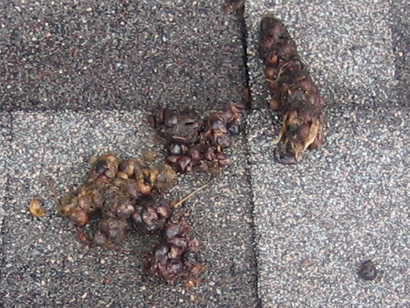- USA Wildlife Removal Education Guide and Resources
Raccoon Feces - Pictures, Danger, and Diseases

Raccoon Feces - Whether you find a concealed raccoon latrine in your yard or garden, or you encounter raccoon feces while you are investigating a possible animal problem in your attic or wall cavity, it is very important to treat raccoon feces with caution. It can transmit several different types of diseases, and there is often quite a lot of it, meaning that you need to be careful and cautious when cleaning up any raccoon feces. Indeed, if you aren't confident in dealing with the issue, and you're worried the raccoon may still be present around your home, it can often be a good idea to hire a professional wildlife removal expert to ensure there is no more threat from the animal.
Precautions To Take Before Dealing With Animal Feces
Whether you are going into an area where there is likely to be a high concentration of animal feces, or heading into a confined space such as an attic that might contain feces, it is important to take the right precautions. Make sure you wear appropriate long sleeved clothing with thick material, along with thick gloves such as gardening gloves, making sure that there is no skin uncovered to come into contact with the feces. A breathing mask will help you to ensure you don't inhale any airborne spores or particles, while eye goggles can also help to keep them from getting in to your body that way.
Identifying Raccoon Feces
Raccoon feces will often look quite similar to dog poop, with fairly long cylinders that are usually quite dry, and the feces will often have visible pieces of berry, which is typical of raccoon feces. Unlike many animals, raccoons will usually tend to try and use one area as a latrine, where they will deposit the majority of their urine and feces, and seeing a concentration of feces in one area can also be an indication that it is raccoon feces that you are looking at.
Cleaning Raccoon Feces In An Attic Of Wall Cavity
When it comes to cleaning up the feces, the first and most important thing to remember is that diseases and spores can be transmitted, so you need to make sure that you wear the appropriate clothing, and that you protect yourself wearing the mask and goggles. You also need to ensure that you either have several black garbage bags that can be used to carry the feces, or a sealable container into which the feces can be placed. In many cases, insulation material will have been torn or heavily soiled by the raccoon feces, and in this case it is usually best to replace the material rather than clean it. Once the feces is removed, spraying the area with a disinfectant solution will help to make the area safe and decontaminated again.
Disposing Of Raccoon Feces
If you weren't already aware of the possibility of contamination and disease transmission caused by raccoon feces, it is also very important that you dispose of the feces correctly. If the material is within one garbage bag, seal that bag, and place it within a second bag that is also sealed. This should be tough enough to keep the material inside, and allow for the bags to be put out with the garbage, while a sealed container can also be put out this way. However, you can also look to bury the material or incinerate it, with incineration helping to make sure that no other harmful particles escape from the feces.
Diseases Transmitted By The Feces
One of the most common diseases that can be transmitted through raccoon feces is raccoon roundworm, and usually happens when the eggs that are found in the feces are inhaled or swallowed. Symptoms can include respiratory problems, nausea and a loss of balance. Giardia is another common disease transmitted through raccoon feces, and can cause stomach cramps, nausea and diarrhea. Leptospirosis is another condition that can be contracted by those dealing with raccoon feces without taking the right precautions, and while symptoms such as headaches, jaundice and fever can be early indications, in rare cases it can have serious repercussions for the individual.
Carrying Out Repairs To Raccoon Damage
If you are dealing with an area that has been damaged by raccoons, it is very important that you look to ensure the safety of others that might need to enter that area or cavity in the future. This means removing the feces responsibly, and then disposing of the feces in a way that won't harm anyone else along the way. Once this is done, make sure that you replace any areas of insulation that have been soiled by the raccoon, and check on all wires and cables to make sure they haven't been gnawed by the raccoon.
Finally, make sure that the area is decontaminated with a disinfectant spray that will kill off any remaining bacteria or spores, and will allow you to start using the area safely again.
Go back to the main Raccoon Removal page for more information about raccoon droppings, feces, or poop. Are the raccoon feces toxic or dangerous? What kind of diseases can you catch from raccoon droppings or excrement.

